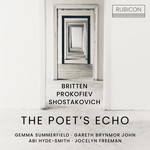
The Poet's Echo
 $35.00
Out of Stock
$35.00
Out of Stock6+ weeks add to cart
PROKOFIEV / SHOSTAKOVICH / BRITTEN
The Poet's Echo
Gemma Summerfield (soprano), Gareth Brynmor John (baritone), Abi Hyde-Smith (cello), Jocelyn Freeman (piano)
[ Rubicon / CD ]
Release Date: Friday 31 March 2023
This item is currently out of stock. It may take 6 or more weeks to obtain from when you place your order as this is a specialist product.
Alexander Pushkin (1799-1837) effectively founded Russian literature, elevating his mother tongue to match the wit and penetrating observation of the French, Spanish and English writers he admired. He was revered even through the Soviet years, the hundredth anniversary of his death being grandly commemorated in 1936 during Stalin's reign. It was for that occasion that the two sets of Pushkin songs by Russia's leading composers of that time - Prokofiev and Shostakovich - were originally composed. In the actual lines set by Prokofiev, the poet reflects that both himself and his own life have changed a great deal in the past decade, yet it seems 'just yesterday that I wandered in these groves'. Was Prokofiev thinking of his own experience, having lived outside Russia for 18 or so years? The music itself is ambiguous, its chilly opening dissonances looking forward to the enigmatic style of his Eighth Piano Sonata (of 1944), which similarly looks back to an implicitly distant past.
There's a strong connection with his 5th Symphony in the first of Shostakovich's Four Pushkin Romances. In 'Renaissance', Shostakovich clearly saw parallels between Pushkin's words - 'A barbarian artist with his sleepy paintbrush/Blackens the picture of a genius' - and his own recent lambasting by the Stalinist apparatchiks following the Pravda editorial. Not only is Shostakovich's setting of that opening phrase alluded to by the opening of the Fifth's finale, but the piano part's motif at the song's final stanza is quoted directly in that symphonic movement before its final peroration.
In later life, Shostakovich became friends with the English composer, Benjamin Britten, who also befriended the cellist and pianist Mstislav Rostropovich (a sometime pupil of Shostakovich's) and his wife the soprano Galina Vishnevskaya. It was specifically for the latter two artists that Britten in 1965 composed The Poet's Echo. Though not a song cycle as such, it follows a theme, as Britten explained: 'It is really a dialogue between the poet and the unresponsiveness of the natural world he describes.' Given Rostropovich's dual abilities as pianist and cellist, it seems appropriate that we hear the piano part in these songs arranged for these two instruments, the cello effectively a second 'singing' line that duets with the voice part originally written for his wife, Vishnevskaya.
Tracks:
Prokofiev: 3 Pushkin Romances Op.73
Shostakovich: Cello Sonata Op.40, 4 Pushkin Romances Op.46
Britten: The Poet's Echo Op.76 9 (arr.Freeman/Hyde-Smith)